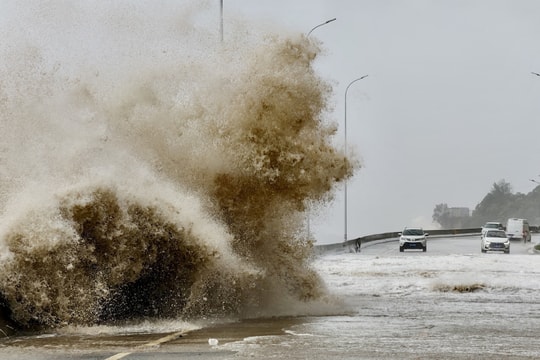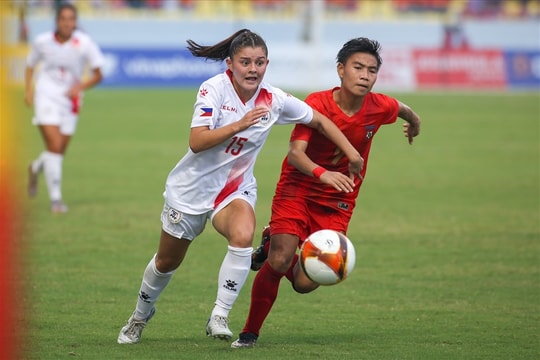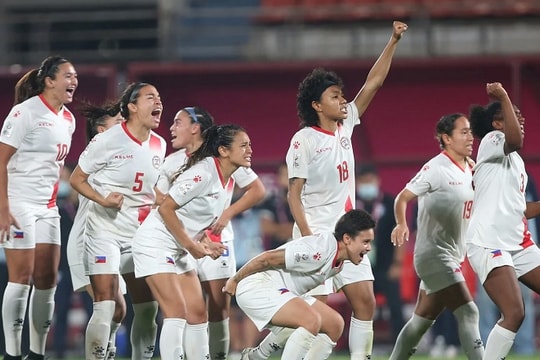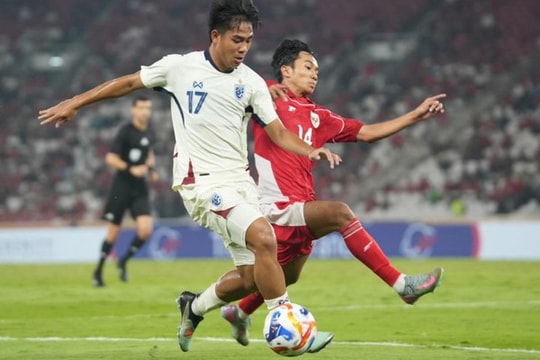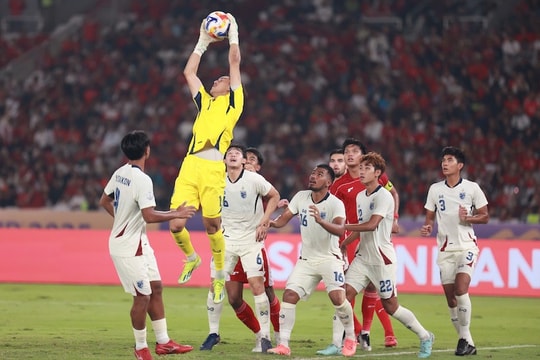China changed 180 degrees after the ruling on the nine-dash line
(Baonghean) - After the ruling of the Permanent Court of Arbitration (PCA) in The Hague on the East Sea issue, China expressed its willingness to have bilateral dialogue with the Philippines and related countries to find an intermediate solution in the process of finding a fundamental solution. To better understand this new development, Nghe An Newspaper interviewed Associate Professor, Dr., Major General Le Van Cuong - Former Director of the Institute of Strategy and Science, Ministry of Public Security.
Reporter: The ruling on the Philippines' lawsuit against China has received great attention from international public opinion. Could you please provide readers with the most basic outlines of the ruling?
Major General Le Van Cuong:In January 2013, the Philippines filed a lawsuit against China at the Permanent Court of Arbitration in The Hague, established under Annex VII of the 1982 United Nations Convention on the Law of the Sea (UNCLOS). On July 12, the PCA issued a ruling on four issues, focusing on two points:
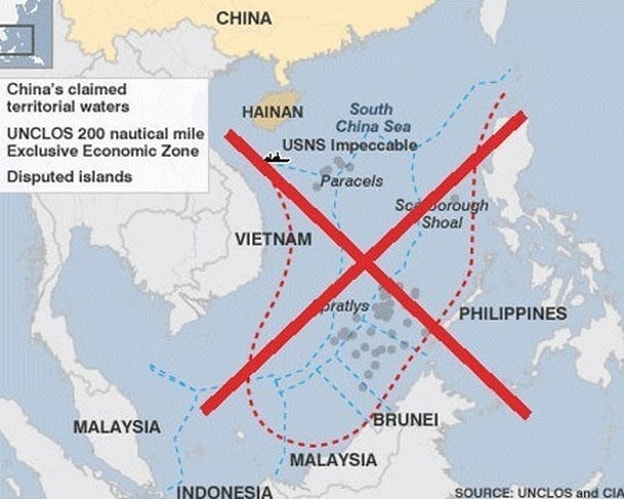 |
| China's absurd nine-dash line encompasses most of the East Sea. Photo: Internet. |
Firstly, the Permanent Court of Arbitration declared that China's claim of sovereignty and interests within the "nine-dash line" goes against the 1982 UNCLOS, meaning that China has no legal basis to claim rights and interests in this sea area.
Second, regarding the legal status of features in the Spratly Islands, UNCLOS 1982 divides features at sea into 3 groups: semi-submerged features - not entitled to determine the 12-nautical mile territorial waters as well as the 200-nautical mile exclusive economic zone; rocks (floating above the water, not suitable for human habitation) - the possessing countries can only establish a 12-nautical mile territorial sea around them; and islands (areas of land and rocks that are above the water at high tide, with all natural conditions for human existence and habitation). According to the recent ruling of the PCA, the 100 features in the Spratly Islands are all semi-submerged features and rocks, not islands.
With the above two rulings, the PCA has stripped China of all legal basis for its claim of the “nine-dash line” and its claim of sovereignty over the rocks, including the artificial islands that the country has built up itself such as Cross Reef, Gac Ma Reef, Subi Reef, Vanh Khan Reef, etc.
PV: What is the significance of the Permanent Court of Arbitration's rulings, Major General?
Major General Le Van Cuong:First of all, the judgment demonstrates the rule of law in the contemporary world, meaning that in the current situation, any country, big or small, must comply with international law.
In addition, the ruling provides additional legal basis for the Philippines, Vietnam and many other countries to fight to protect their sovereignty and legitimate interests in the East Sea, rejecting all "legal basis" as well as unreasonable claims of China.
Equally important, the Arbitral Tribunal's ruling helps the international community gain a clearer view of the nature of China's claims and better understand the legitimacy of the Philippines, Vietnam, and other countries.
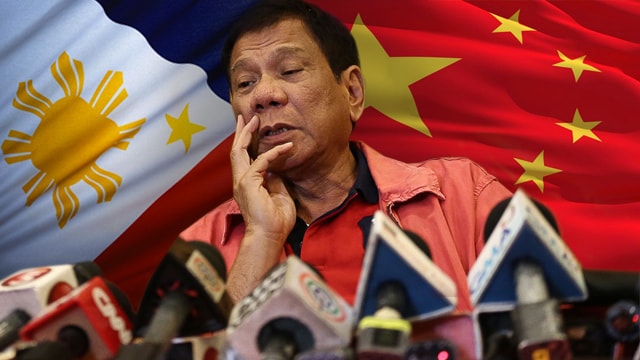 |
| Public opinion is interested in how Philippine President Rodrigo Duterte will deal with China in the coming time. Photo: Rappler |
Public opinion is overwhelmingly in favor of the Philippines, Vietnam, and other countries, while criticizing and condemning China’s illegal actions in the East Sea. From the US to Japan, the EU, India, etc., the international community has spoken out in support of the above ruling.
Faced with that situation, China cannot act more aggressively when the PCA - the International Arbitration Organization, the United Nations court representing justice and reason in the world, accepted by 193 members of the United Nations to issue a compulsory judgment, with international legal status, reflecting the conscience and legitimate aspirations of the people of the world.
China has of course been forced into a passive position, facing a more difficult situation than ever since 1949. So they are forced to show flexibility. A few days ago, China's State Councilor in charge of foreign affairs Yang Jiechi made an indirect announcement that Beijing is willing to engage in bilateral dialogue with Manila and other countries to find an intermediate, transitional solution on the basis of a settlement.
Then, on July 26, Chinese Foreign Minister Wang Yi officially asked US Secretary of State John Kerry to mediate bilateral dialogue between China and the Philippines, and at the same time announced that China is willing to negotiate with relevant parties to find a transitional solution in the process of resolving the East Sea issue at its root. This is a completely new statement, a "180-degree turn" compared to China's previous aggressive and arrogant attitude.
PV: Major General, why is there such a change from China?
Major General Le Van Cuong:The recent ruling from the United Nations Court has put China in a position of being opposed by the whole world.
There is no other way, China is forced to take a step back because the more aggressive and belligerent it becomes, the more isolated it will be. It has been decades since China has been in such a difficult and passive situation, in terms of diplomacy, security, politics and law.
But this is just a tactical change to “buy time”, not a fundamental change by China. They try to “buy time” for reconciliation to show that they are also responsible and that finding an intermediate, transitional solution is considered suitable with the content of UNCLOS 1982.
In other words, Beijing is choosing to apply the UN Convention where it is advantageous, and when it is disadvantageous, it will choose to abandon it.
It is the current context that forces China to change, international pressure makes China not do whatever it wants. If the international community boycotts, China risks collapsing. Secondly, this change of China is tactical, but in essence does not demonstrate anything. To ease the situation, to make the world think that China is also responsible, willing to negotiate bilaterally with other countries, China chose this "move" to buy time and save face for Beijing in the face of difficult circumstances.
PV: How will the Philippines respond to this request, Major General?
Major General Le Van Cuong:I think the Philippine President will respond to China's proposal for dialogue. But even so, President Rodrigo Duterte will not turn his back on the United States, and will only adjust relations with China within certain limits.
In other words, the Philippine President will comply with and respect the ruling of the Arbitral Tribunal, but will be “softer” with China. It is likely that China will increase investment in the Philippines, build highways, airports, ports, etc. to appease public opinion in Manila.
For my part, I think that Vietnam first of all supports China's soft stance, but at the same time clearly recognizes that Vietnam's national interests and legitimate sovereignty in the East Sea cannot be changed. We still need to persistently fight with China to protect our legitimate rights and interests in the East Sea. And the PCA's ruling is beneficial to the international community in general, the Philippines and Vietnam in particular, in the bilateral and multilateral struggle with China on the East Sea issue.
PV: Thank you very much, Major General.
Thu Giang
| RELATED NEWS |
|---|


